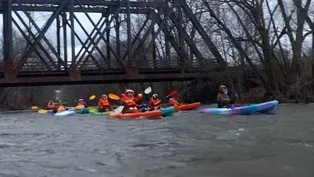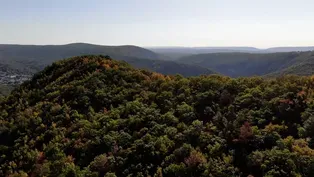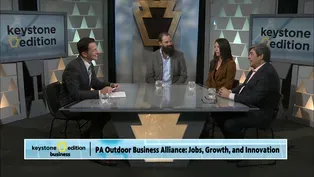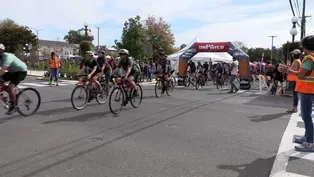Keystone Edition
Economic & Cultural Impacts of Outdoor Recreation in PA
Clip: 11/11/2024 | 13m 1sVideo has Closed Captions
The panelists explore the broad economic and communal impacts of outdoor recreation in Pennsylvania.
Discussions include how tourism supports local economies, the interconnected growth of related businesses, and conservation efforts for future generations. Hear insights from industry leaders on fostering collaboration and expanding opportunities in the state’s outdoor sector.
Problems with Closed Captions? Closed Captioning Feedback
Problems with Closed Captions? Closed Captioning Feedback
Keystone Edition is a local public television program presented by WVIA
Keystone Edition
Economic & Cultural Impacts of Outdoor Recreation in PA
Clip: 11/11/2024 | 13m 1sVideo has Closed Captions
Discussions include how tourism supports local economies, the interconnected growth of related businesses, and conservation efforts for future generations. Hear insights from industry leaders on fostering collaboration and expanding opportunities in the state’s outdoor sector.
Problems with Closed Captions? Closed Captioning Feedback
How to Watch Keystone Edition
Keystone Edition is available to stream on pbs.org and the free PBS App, available on iPhone, Apple TV, Android TV, Android smartphones, Amazon Fire TV, Amazon Fire Tablet, Roku, Samsung Smart TV, and Vizio.
Providing Support for PBS.org
Learn Moreabout PBS online sponsorship- [Crew Member] Standby.
- So some amazing sites and scenes from Downtown Lewisburg.
I was there actually while WVIA was connecting with some of the cyclists and local business owners, Amazing day for the downtown and for the businesses there, and not just the bike shop.
So, Chris, I wanted to ask you, Nathan referred to the cross industry connection.
Can you expand on that?
How outdoor recreation doesn't just build businesses who are catering directly to people in the outdoors, enjoying the outdoors, but boosts an economy and region more broadly than that?
- It certainly does.
So in the Pocono Mountains, we're four counties, Carbon, Monroe, Wayne and Pike.
About 30 million folks visit the Pocono Mountains yearly and it leaves behind about $4.7 billion in economic effect.
So tourism is a form of economic development, there's no question about it.
And for every dollar that's brought in through tourism, it generates up to five in additional spending.
And for our region specifically, 75% of the visitation is from New York.
So those are absolutely outside dollars that are coming into the state generating tax revenue.
So from our destination alone, this is just one, we generate $843 million in local, state and federal taxes.
And it proliferates all across.
Because when somebody comes and recreates on any one of our two rivers, for instance, you know, they'll have breakfast, lunch, dinner, they'll stay overnight.
That's a huge expenditure that our new dollars coming into the Commonwealth.
So it's absolutely a great form of economic development.
And I think what's really great is the Shapiro administration has really completely embraced that.
They've embraced the notion that tourism is a great, great form of economic development.
And I only think we're going to continue our trajectory upward because even in our destination as early as 2017, we saw $3.1 billion in total spending.
And as I noted, the past year in '24, it was $4.7 billion.
So it's on a trajectory upward.
And people enjoy recreating in Pennsylvania.
There's no question.
- Visitors spending so vital, that influx of new money into a community can drive an economy.
Nathan, I wanna go back to the connectivity across the community.
Chris, build on that a little bit, like the connections across local people enjoy the outdoors in their communities, too.
- They do.
And we've seen a lot of businesses open completely centered around recreation.
So we have whitewater rafters in a number of our destinations on the river.
And, you know, you'll have folks who will come in and rent a raft, they'll have guides, all those types of things.
And then when they come back to the destination itself, there are small coffee shops.
I mean, it's a whole cottage industry that is revitalizing a lot of our towns in Pennsylvania that were built up during the Industrial Revolution, right?
And into the forties and fifties, they want the decline of coal, especially in our market.
You know, we saw a whole brand new vitalization with tourism.
So one only has to really look, for instance, to Jim Thorpe.
You know, Jim Thorpe was unfortunately by the eighties almost let's turn the light off the last person who's in Jim Thorpe.
So during the fall, for instance, in our visitor center, we had 30,000 people a week visiting our visitor center.
That's because of the river, that's because of fall leaves, that's because of hiking.
So there's no question that it's a huge component of our economy and there's a lot of cross connection of businesses that you normally wouldn't think would be there if it were not for tourism.
- Thanks.
So Katie, one of the things we saw in Sara Sento's opening was conservation.
Let's not just get out and enjoy the outdoors now, but let's make sure that future generations, your sons are able to enjoy this.
- Yes.
- Talk about why that's important and your own role volunteering in that regard.
- Oh, yes.
Well, I think it's extremely important.
And I'm a volunteer board member of the Middle Susquehanna Riverkeeper Association as well as the Robert Porter Allen Natural Area.
The Middle Susquehanna Riverkeeper Association does a lot of work to protect the health of the Susquehanna River.
The Robert Porter Allen Natural area is a 300-acre conservation recreation area with a 75-acre wetland.
And I love doing the volunteer work.
So I'm an entrepreneur involved in outdoor recreation.
I'm also a river keeper and involved with a recreation conservation project.
So I have a broad perspective of how it all ties together.
- Those two perspectives obviously overlap and reinforce each other.
What is the work of a river keeper?
- So the Middle Susquehanna river keeper is actually John Zaktansky.
He's our Executive Director.
And it involves a lot.
It involves connecting children to experience fishing and kayaking.
There's also a Vernal School environmental education partnership, which works together with many partners to connect people to nature, but also, at times, checking industry.
So industries that pollute the Susquehanna River and keeping them in check.
and observing things that they're doing.
- Well, thank you for that work.
Keep our Susquehanna beautiful.
Yeah, absolutely.
So, Nathan, talk about that.
Like, now blow this up to the state level.
Policy for outdoor recreation industry and your work towards conservation of these amenities for future generations.
- Yeah.
The question you're asking right now ties together perfectly what we've just been talking about.
Outdoor recreation is an industry.
We'd like to see it grow from a cottage to a substantially sized farmhouse or something like this.
- Very picturesque.
- Yeah.
Maybe Cabot.
This industry, all of the players, all of our producers of outdoor equipment, all of our providers of outdoor experiences, all of our professionals working in this space, they are not knit together.
They're not pooled together right now into an advocacy body that can speak on behalf of the outdoor industry that can bring the weight of industry to bear to counterbalance and contribute to conservation for the interest that Katie was just talking about.
And this is why Elevate, the business engagement program, you showed a poster of it earlier.
Elevatepaoutdoors.com is the website for this effort.
That's why this initiative is so important, to get the voices of business together and tell us, what do they need?
What do they need to address regulatory, permitting, and trade barriers to growth?
What do they need in terms of access to capital workforce development supports, entrepreneurial, technical supports, stimulus for innovation?
And importantly, how can outdoor businesses band together to grow the outdoor clientele, to bring more people into the outdoors and help preserve and develop the natural resources that are really the fertile ground from which the outdoor industry grows?
- Expand on that power of connections across business owners.
We know of other industry groups that advocate, that collaborate.
What are the opportunities for a business to join in and benefit?
- The basic principle is that we are all stronger together.
If our voices are speaking in unison, they will speak loud and they will speak clear.
Our outdoor industry, by and large, is a collection of small businesses distributed broadly across the Commonwealth, working in all kinds of different sectors.
That leads to a lot of creativity.
It leads to a lot of local impacts in the Commonwealth.
But without being tied together, this industry is not as visible as it needs to be in Harrisburg.
Our efforts here in the Commonwealth also mirror those occurring nationally with efforts to organize the outdoor industry at a national level in Washington DC.
So the hope of all of this is that for those of us in Harrisburg, we can hear the voices of outdoor businesses, understand their needs, be able to better serve them, and outdoor businesses themselves will have a peer network, will have a team that they can draw upon to grow.
- Yeah.
- Build on that, Katie.
- Yeah.
So I've been to many of the listening sessions that Nathan has hosted about the Office of Outdoor Recreation and the Outdoor Business Alliance.
And what I see is something really exciting happening.
Businesses who may usually compete are working together toward common goals.
And with Nathan as the facilitator of that, the industry can only grow by leaps and bounds.
- That's great.
So Chris, that cooperation across businesses that might otherwise view each other as competitors, do you have a perspective on that too?
- I totally agree with that, and I think Nathan's done a great job in the sector.
Because it's just part of the administration listening to a sector that's now beginning to grow, it's beginning to flourish.
And we need to continue to be able to make that flourish by giving the industry what it needs.
And I do agree that people are now seeing that as a common goal.
They're not competing with each other in the sense where they're all putting on their recreation hat to say, how do we grow this?
How do we make it better?
And that's kind of all what we really wanna do.
We all wanna row the boat in the same direction.
And it's happening, which is really great.
- You do that for a region and drawing people to the Poconos to enjoy the beauty, the outdoors there.
What will it be like for regions to also not see each other as competitors?
Okay, you can go to the Poconos one day, you can go out to the, you know, other as regions of the state.
How do you approach that?
Okay, there's a visitors bureau, there's a chamber here and there, bringing those organizations together, too.
What's that work like?
- Oh, fundamentally, if we grow the pie, then there's more pie for all of us.
That's the philosophy behind our work.
As an outdoor recreationist, I know that one weekend, I'm gonna come here to the Poconos, another weekend, I'm gonna go to the Southern Alleghenies.
And we move around, the diversity of experiences building a whole economy for Pennsylvania.
That's where we see the opportunity.
And I'm very heartened to hear that you feel that the Shapiro administration is in fact approaching this.
A big hallmark of our work together is fostering collaboration among agencies within the Commonwealth, outdoor recreation, tourism's a very tight collaboration, and trying to elevate the profile of Pennsylvania so that it's attractive for Pennsylvanians and for visitors.
- Well, Katie, going back to you, what's a favorite place to bring your boys?
What on Roambler do you think is something that people should definitely, what experience out there do you wanna make sure people take advantage of?
- Yeah, so my favorite thing to do with my boys is fish.
We love fishing and they love it as well.
Also kayaking.
Anything on the water, really - See you out there on the river?
- Yes, yes.
- I have to say one thing.
Katie said something really interesting when we were prepping for this segment.
She talked about relating all the things about the rivers that were really, really cool.
And what I loved about it was I was on the river at one time too and the guide there really introduced me to a whole new way of life and river life, which was awesome.
- Well, thank you so much, Chris, Katie, Nathan for being here tonight.
For more information on this topic, please visit wvia.org/keystonebusiness.
And remember, you can re-watch this episode on demand anytime online or on the WVIA app.
For "Keystone Edition," I'm Steve Stumbris.
Thanks for watching.
(upbeat electronic music)
PA Outdoor Alliance: Jobs, Growth, Innovation - Preview
Watch Monday, November 11th at 7pm on WVIA TV (30s)
The alliance focuses on sustainable growth, policy advocacy, and preserving natural resources. (1m 9s)
PA's Booming Outdoor Recreation Industry
Video has Closed Captions
Nathan Reigner, Katie Caputo and Chris Barrett discuss the booming outdoor recreation industry in PA (10m 19s)
Providing Support for PBS.org
Learn Moreabout PBS online sponsorshipKeystone Edition is a local public television program presented by WVIA















